A Comprehensive Guide to Leadership and Management Principles
VerifiedAdded on 2021/02/21
|13
|3584
|53
Report
AI Summary
This report provides a comprehensive overview of leadership and management, addressing key questions such as the characteristics of a successful leader, the development of leadership skills, and the distinctions between leadership and management. The report explores various leadership styles, including transformational and servant leadership, and examines the skills and traits necessary for effective leadership. It also delves into the Big Five personality traits, situational approaches, and the application of leadership principles by figures like Richard Branson. Furthermore, it highlights the importance of communication, continuous learning, and adapting to different situations in leadership development. The report concludes by contrasting management with leadership, outlining their respective roles and responsibilities within an organization. This document is intended to help students understand the key concepts of leadership and management.
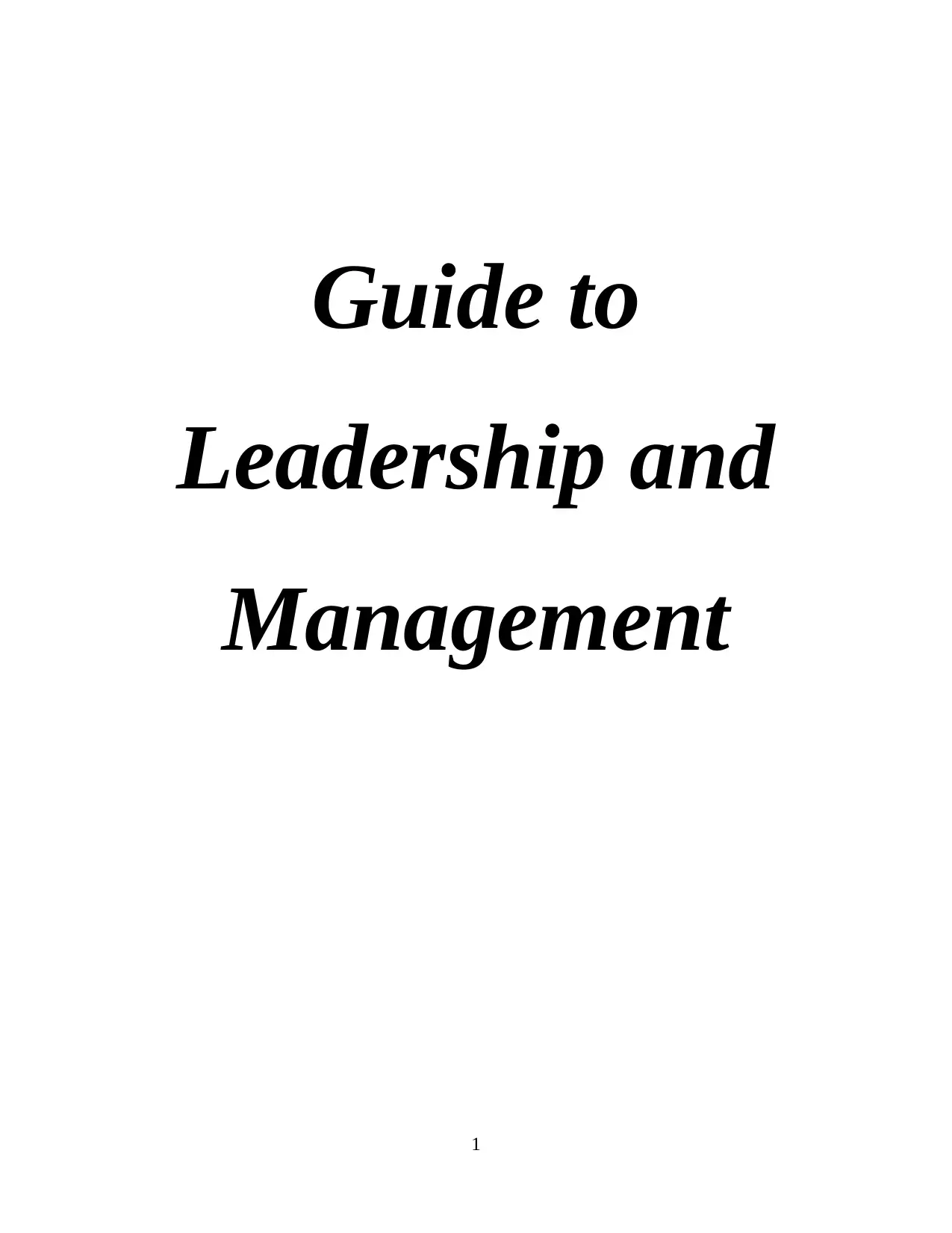
Guide to
Leadership and
Management
1
Leadership and
Management
1
Paraphrase This Document
Need a fresh take? Get an instant paraphrase of this document with our AI Paraphraser
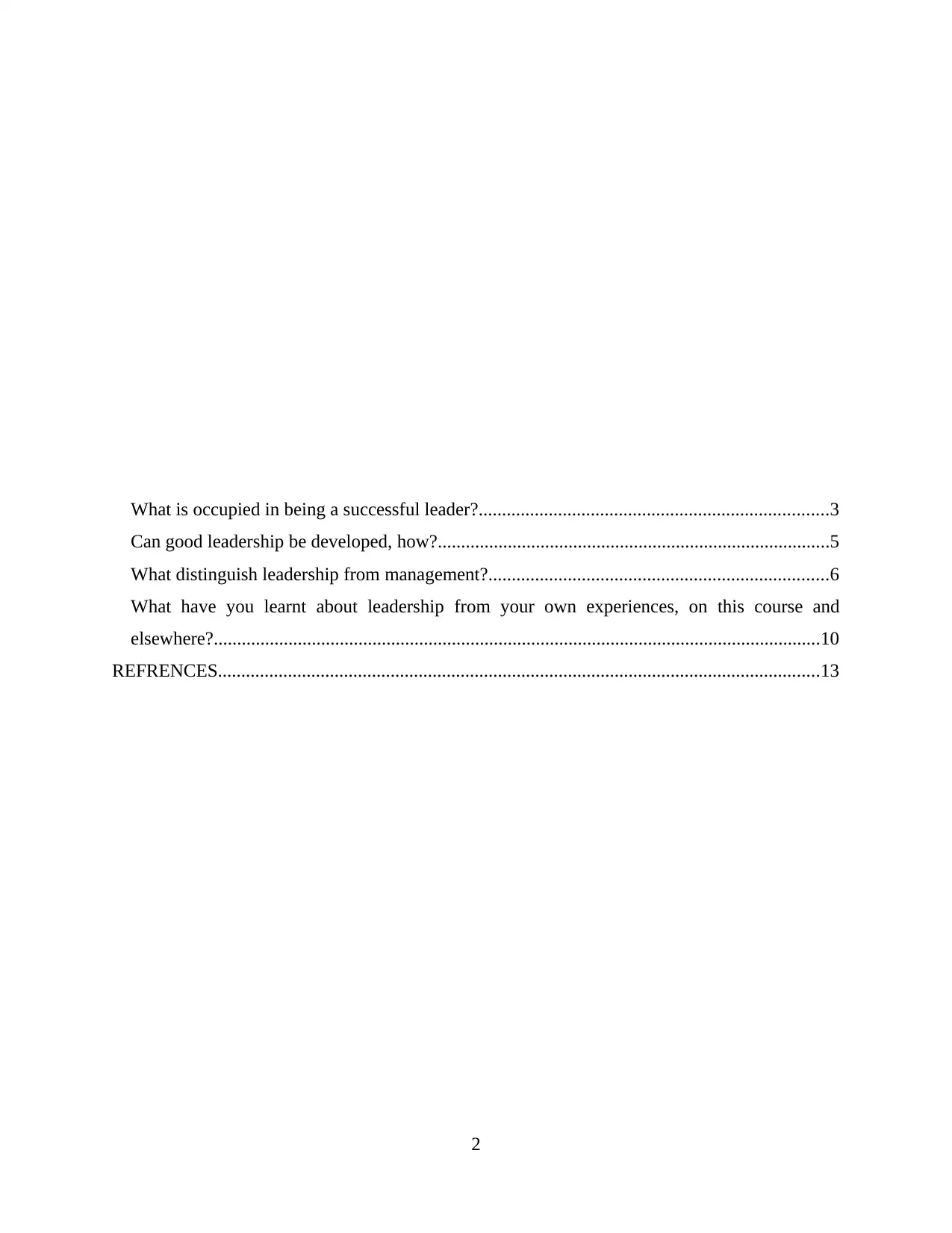
What is occupied in being a successful leader?...........................................................................3
Can good leadership be developed, how?....................................................................................5
What distinguish leadership from management?.........................................................................6
What have you learnt about leadership from your own experiences, on this course and
elsewhere?..................................................................................................................................10
REFRENCES.................................................................................................................................13
2
Can good leadership be developed, how?....................................................................................5
What distinguish leadership from management?.........................................................................6
What have you learnt about leadership from your own experiences, on this course and
elsewhere?..................................................................................................................................10
REFRENCES.................................................................................................................................13
2
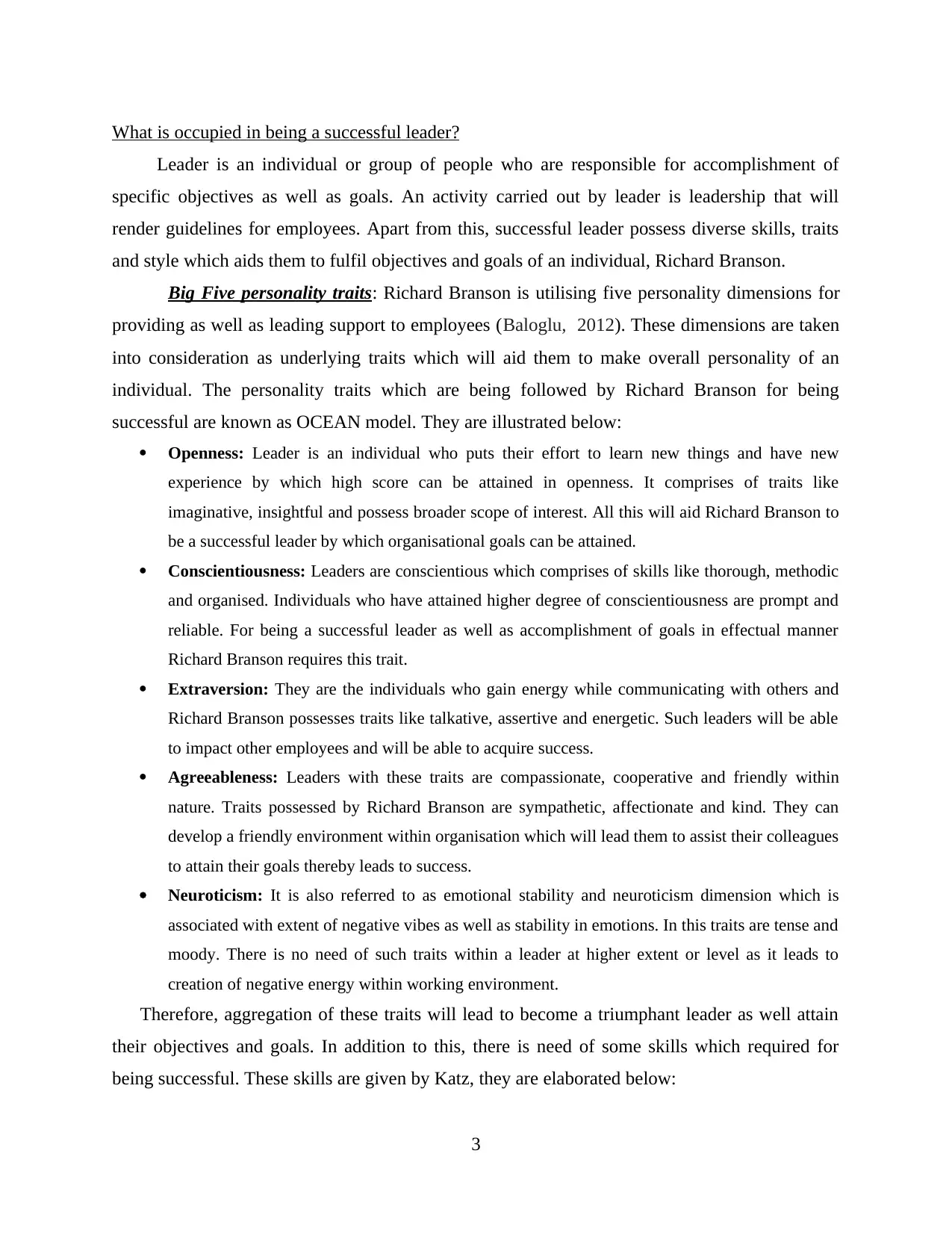
What is occupied in being a successful leader?
Leader is an individual or group of people who are responsible for accomplishment of
specific objectives as well as goals. An activity carried out by leader is leadership that will
render guidelines for employees. Apart from this, successful leader possess diverse skills, traits
and style which aids them to fulfil objectives and goals of an individual, Richard Branson.
Big Five personality traits: Richard Branson is utilising five personality dimensions for
providing as well as leading support to employees (Baloglu, 2012). These dimensions are taken
into consideration as underlying traits which will aid them to make overall personality of an
individual. The personality traits which are being followed by Richard Branson for being
successful are known as OCEAN model. They are illustrated below:
Openness: Leader is an individual who puts their effort to learn new things and have new
experience by which high score can be attained in openness. It comprises of traits like
imaginative, insightful and possess broader scope of interest. All this will aid Richard Branson to
be a successful leader by which organisational goals can be attained.
Conscientiousness: Leaders are conscientious which comprises of skills like thorough, methodic
and organised. Individuals who have attained higher degree of conscientiousness are prompt and
reliable. For being a successful leader as well as accomplishment of goals in effectual manner
Richard Branson requires this trait.
Extraversion: They are the individuals who gain energy while communicating with others and
Richard Branson possesses traits like talkative, assertive and energetic. Such leaders will be able
to impact other employees and will be able to acquire success.
Agreeableness: Leaders with these traits are compassionate, cooperative and friendly within
nature. Traits possessed by Richard Branson are sympathetic, affectionate and kind. They can
develop a friendly environment within organisation which will lead them to assist their colleagues
to attain their goals thereby leads to success.
Neuroticism: It is also referred to as emotional stability and neuroticism dimension which is
associated with extent of negative vibes as well as stability in emotions. In this traits are tense and
moody. There is no need of such traits within a leader at higher extent or level as it leads to
creation of negative energy within working environment.
Therefore, aggregation of these traits will lead to become a triumphant leader as well attain
their objectives and goals. In addition to this, there is need of some skills which required for
being successful. These skills are given by Katz, they are elaborated below:
3
Leader is an individual or group of people who are responsible for accomplishment of
specific objectives as well as goals. An activity carried out by leader is leadership that will
render guidelines for employees. Apart from this, successful leader possess diverse skills, traits
and style which aids them to fulfil objectives and goals of an individual, Richard Branson.
Big Five personality traits: Richard Branson is utilising five personality dimensions for
providing as well as leading support to employees (Baloglu, 2012). These dimensions are taken
into consideration as underlying traits which will aid them to make overall personality of an
individual. The personality traits which are being followed by Richard Branson for being
successful are known as OCEAN model. They are illustrated below:
Openness: Leader is an individual who puts their effort to learn new things and have new
experience by which high score can be attained in openness. It comprises of traits like
imaginative, insightful and possess broader scope of interest. All this will aid Richard Branson to
be a successful leader by which organisational goals can be attained.
Conscientiousness: Leaders are conscientious which comprises of skills like thorough, methodic
and organised. Individuals who have attained higher degree of conscientiousness are prompt and
reliable. For being a successful leader as well as accomplishment of goals in effectual manner
Richard Branson requires this trait.
Extraversion: They are the individuals who gain energy while communicating with others and
Richard Branson possesses traits like talkative, assertive and energetic. Such leaders will be able
to impact other employees and will be able to acquire success.
Agreeableness: Leaders with these traits are compassionate, cooperative and friendly within
nature. Traits possessed by Richard Branson are sympathetic, affectionate and kind. They can
develop a friendly environment within organisation which will lead them to assist their colleagues
to attain their goals thereby leads to success.
Neuroticism: It is also referred to as emotional stability and neuroticism dimension which is
associated with extent of negative vibes as well as stability in emotions. In this traits are tense and
moody. There is no need of such traits within a leader at higher extent or level as it leads to
creation of negative energy within working environment.
Therefore, aggregation of these traits will lead to become a triumphant leader as well attain
their objectives and goals. In addition to this, there is need of some skills which required for
being successful. These skills are given by Katz, they are elaborated below:
3
⊘ This is a preview!⊘
Do you want full access?
Subscribe today to unlock all pages.

Trusted by 1+ million students worldwide
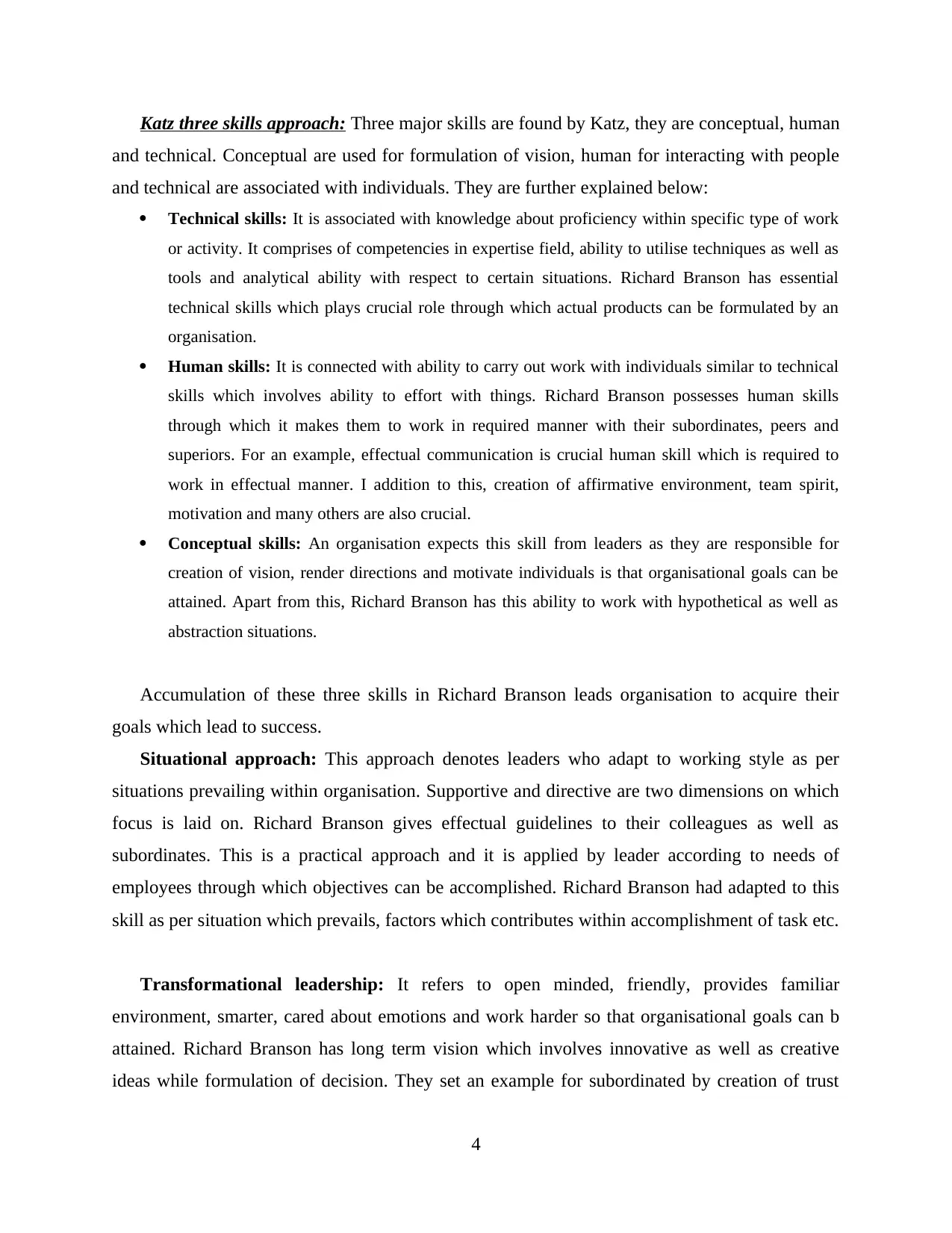
Katz three skills approach: Three major skills are found by Katz, they are conceptual, human
and technical. Conceptual are used for formulation of vision, human for interacting with people
and technical are associated with individuals. They are further explained below:
Technical skills: It is associated with knowledge about proficiency within specific type of work
or activity. It comprises of competencies in expertise field, ability to utilise techniques as well as
tools and analytical ability with respect to certain situations. Richard Branson has essential
technical skills which plays crucial role through which actual products can be formulated by an
organisation.
Human skills: It is connected with ability to carry out work with individuals similar to technical
skills which involves ability to effort with things. Richard Branson possesses human skills
through which it makes them to work in required manner with their subordinates, peers and
superiors. For an example, effectual communication is crucial human skill which is required to
work in effectual manner. I addition to this, creation of affirmative environment, team spirit,
motivation and many others are also crucial.
Conceptual skills: An organisation expects this skill from leaders as they are responsible for
creation of vision, render directions and motivate individuals is that organisational goals can be
attained. Apart from this, Richard Branson has this ability to work with hypothetical as well as
abstraction situations.
Accumulation of these three skills in Richard Branson leads organisation to acquire their
goals which lead to success.
Situational approach: This approach denotes leaders who adapt to working style as per
situations prevailing within organisation. Supportive and directive are two dimensions on which
focus is laid on. Richard Branson gives effectual guidelines to their colleagues as well as
subordinates. This is a practical approach and it is applied by leader according to needs of
employees through which objectives can be accomplished. Richard Branson had adapted to this
skill as per situation which prevails, factors which contributes within accomplishment of task etc.
Transformational leadership: It refers to open minded, friendly, provides familiar
environment, smarter, cared about emotions and work harder so that organisational goals can b
attained. Richard Branson has long term vision which involves innovative as well as creative
ideas while formulation of decision. They set an example for subordinated by creation of trust
4
and technical. Conceptual are used for formulation of vision, human for interacting with people
and technical are associated with individuals. They are further explained below:
Technical skills: It is associated with knowledge about proficiency within specific type of work
or activity. It comprises of competencies in expertise field, ability to utilise techniques as well as
tools and analytical ability with respect to certain situations. Richard Branson has essential
technical skills which plays crucial role through which actual products can be formulated by an
organisation.
Human skills: It is connected with ability to carry out work with individuals similar to technical
skills which involves ability to effort with things. Richard Branson possesses human skills
through which it makes them to work in required manner with their subordinates, peers and
superiors. For an example, effectual communication is crucial human skill which is required to
work in effectual manner. I addition to this, creation of affirmative environment, team spirit,
motivation and many others are also crucial.
Conceptual skills: An organisation expects this skill from leaders as they are responsible for
creation of vision, render directions and motivate individuals is that organisational goals can be
attained. Apart from this, Richard Branson has this ability to work with hypothetical as well as
abstraction situations.
Accumulation of these three skills in Richard Branson leads organisation to acquire their
goals which lead to success.
Situational approach: This approach denotes leaders who adapt to working style as per
situations prevailing within organisation. Supportive and directive are two dimensions on which
focus is laid on. Richard Branson gives effectual guidelines to their colleagues as well as
subordinates. This is a practical approach and it is applied by leader according to needs of
employees through which objectives can be accomplished. Richard Branson had adapted to this
skill as per situation which prevails, factors which contributes within accomplishment of task etc.
Transformational leadership: It refers to open minded, friendly, provides familiar
environment, smarter, cared about emotions and work harder so that organisational goals can b
attained. Richard Branson has long term vision which involves innovative as well as creative
ideas while formulation of decision. They set an example for subordinated by creation of trust
4
Paraphrase This Document
Need a fresh take? Get an instant paraphrase of this document with our AI Paraphraser
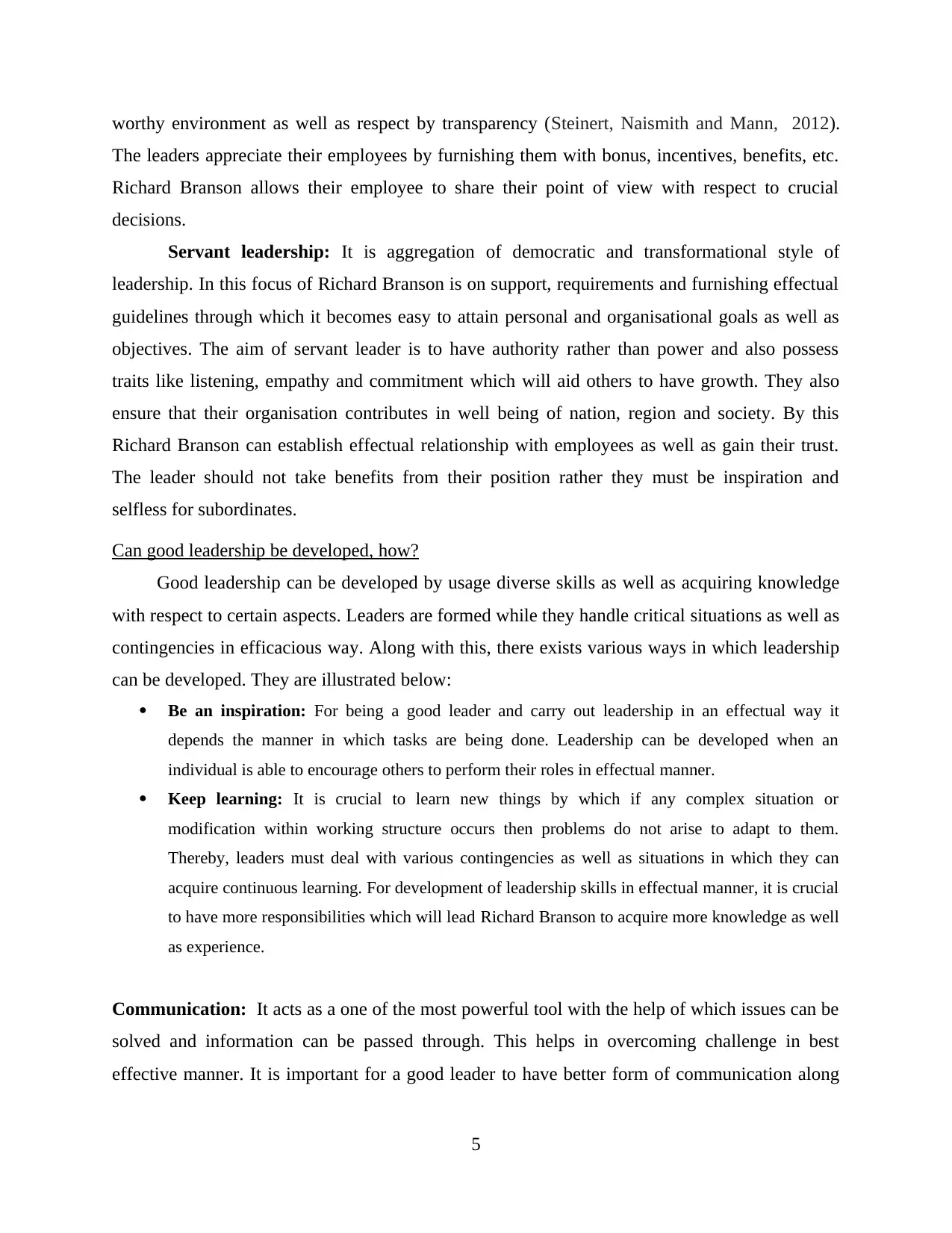
worthy environment as well as respect by transparency (Steinert, Naismith and Mann, 2012).
The leaders appreciate their employees by furnishing them with bonus, incentives, benefits, etc.
Richard Branson allows their employee to share their point of view with respect to crucial
decisions.
Servant leadership: It is aggregation of democratic and transformational style of
leadership. In this focus of Richard Branson is on support, requirements and furnishing effectual
guidelines through which it becomes easy to attain personal and organisational goals as well as
objectives. The aim of servant leader is to have authority rather than power and also possess
traits like listening, empathy and commitment which will aid others to have growth. They also
ensure that their organisation contributes in well being of nation, region and society. By this
Richard Branson can establish effectual relationship with employees as well as gain their trust.
The leader should not take benefits from their position rather they must be inspiration and
selfless for subordinates.
Can good leadership be developed, how?
Good leadership can be developed by usage diverse skills as well as acquiring knowledge
with respect to certain aspects. Leaders are formed while they handle critical situations as well as
contingencies in efficacious way. Along with this, there exists various ways in which leadership
can be developed. They are illustrated below:
Be an inspiration: For being a good leader and carry out leadership in an effectual way it
depends the manner in which tasks are being done. Leadership can be developed when an
individual is able to encourage others to perform their roles in effectual manner.
Keep learning: It is crucial to learn new things by which if any complex situation or
modification within working structure occurs then problems do not arise to adapt to them.
Thereby, leaders must deal with various contingencies as well as situations in which they can
acquire continuous learning. For development of leadership skills in effectual manner, it is crucial
to have more responsibilities which will lead Richard Branson to acquire more knowledge as well
as experience.
Communication: It acts as a one of the most powerful tool with the help of which issues can be
solved and information can be passed through. This helps in overcoming challenge in best
effective manner. It is important for a good leader to have better form of communication along
5
The leaders appreciate their employees by furnishing them with bonus, incentives, benefits, etc.
Richard Branson allows their employee to share their point of view with respect to crucial
decisions.
Servant leadership: It is aggregation of democratic and transformational style of
leadership. In this focus of Richard Branson is on support, requirements and furnishing effectual
guidelines through which it becomes easy to attain personal and organisational goals as well as
objectives. The aim of servant leader is to have authority rather than power and also possess
traits like listening, empathy and commitment which will aid others to have growth. They also
ensure that their organisation contributes in well being of nation, region and society. By this
Richard Branson can establish effectual relationship with employees as well as gain their trust.
The leader should not take benefits from their position rather they must be inspiration and
selfless for subordinates.
Can good leadership be developed, how?
Good leadership can be developed by usage diverse skills as well as acquiring knowledge
with respect to certain aspects. Leaders are formed while they handle critical situations as well as
contingencies in efficacious way. Along with this, there exists various ways in which leadership
can be developed. They are illustrated below:
Be an inspiration: For being a good leader and carry out leadership in an effectual way it
depends the manner in which tasks are being done. Leadership can be developed when an
individual is able to encourage others to perform their roles in effectual manner.
Keep learning: It is crucial to learn new things by which if any complex situation or
modification within working structure occurs then problems do not arise to adapt to them.
Thereby, leaders must deal with various contingencies as well as situations in which they can
acquire continuous learning. For development of leadership skills in effectual manner, it is crucial
to have more responsibilities which will lead Richard Branson to acquire more knowledge as well
as experience.
Communication: It acts as a one of the most powerful tool with the help of which issues can be
solved and information can be passed through. This helps in overcoming challenge in best
effective manner. It is important for a good leader to have better form of communication along
5
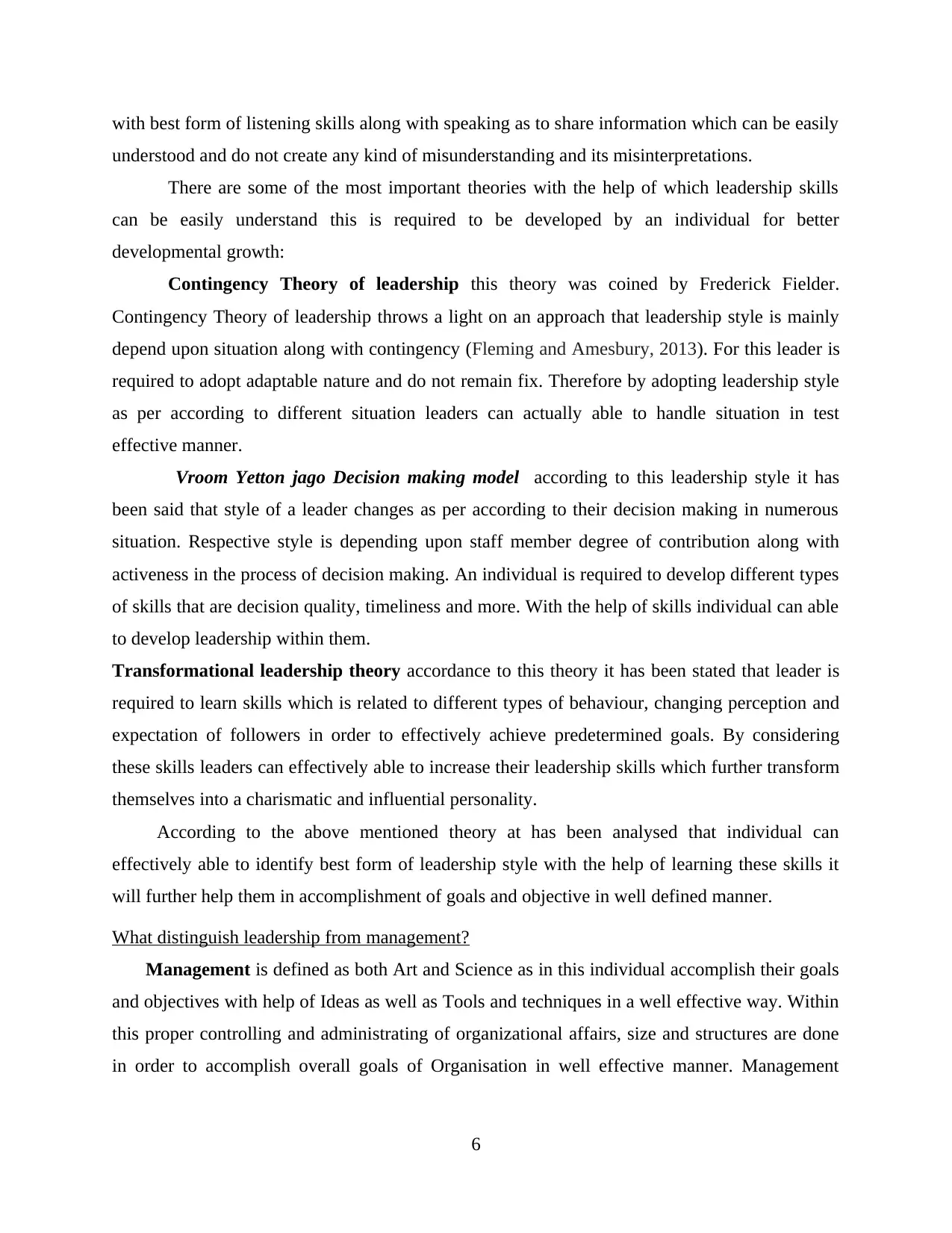
with best form of listening skills along with speaking as to share information which can be easily
understood and do not create any kind of misunderstanding and its misinterpretations.
There are some of the most important theories with the help of which leadership skills
can be easily understand this is required to be developed by an individual for better
developmental growth:
Contingency Theory of leadership this theory was coined by Frederick Fielder.
Contingency Theory of leadership throws a light on an approach that leadership style is mainly
depend upon situation along with contingency (Fleming and Amesbury, 2013). For this leader is
required to adopt adaptable nature and do not remain fix. Therefore by adopting leadership style
as per according to different situation leaders can actually able to handle situation in test
effective manner.
Vroom Yetton jago Decision making model according to this leadership style it has
been said that style of a leader changes as per according to their decision making in numerous
situation. Respective style is depending upon staff member degree of contribution along with
activeness in the process of decision making. An individual is required to develop different types
of skills that are decision quality, timeliness and more. With the help of skills individual can able
to develop leadership within them.
Transformational leadership theory accordance to this theory it has been stated that leader is
required to learn skills which is related to different types of behaviour, changing perception and
expectation of followers in order to effectively achieve predetermined goals. By considering
these skills leaders can effectively able to increase their leadership skills which further transform
themselves into a charismatic and influential personality.
According to the above mentioned theory at has been analysed that individual can
effectively able to identify best form of leadership style with the help of learning these skills it
will further help them in accomplishment of goals and objective in well defined manner.
What distinguish leadership from management?
Management is defined as both Art and Science as in this individual accomplish their goals
and objectives with help of Ideas as well as Tools and techniques in a well effective way. Within
this proper controlling and administrating of organizational affairs, size and structures are done
in order to accomplish overall goals of Organisation in well effective manner. Management
6
understood and do not create any kind of misunderstanding and its misinterpretations.
There are some of the most important theories with the help of which leadership skills
can be easily understand this is required to be developed by an individual for better
developmental growth:
Contingency Theory of leadership this theory was coined by Frederick Fielder.
Contingency Theory of leadership throws a light on an approach that leadership style is mainly
depend upon situation along with contingency (Fleming and Amesbury, 2013). For this leader is
required to adopt adaptable nature and do not remain fix. Therefore by adopting leadership style
as per according to different situation leaders can actually able to handle situation in test
effective manner.
Vroom Yetton jago Decision making model according to this leadership style it has
been said that style of a leader changes as per according to their decision making in numerous
situation. Respective style is depending upon staff member degree of contribution along with
activeness in the process of decision making. An individual is required to develop different types
of skills that are decision quality, timeliness and more. With the help of skills individual can able
to develop leadership within them.
Transformational leadership theory accordance to this theory it has been stated that leader is
required to learn skills which is related to different types of behaviour, changing perception and
expectation of followers in order to effectively achieve predetermined goals. By considering
these skills leaders can effectively able to increase their leadership skills which further transform
themselves into a charismatic and influential personality.
According to the above mentioned theory at has been analysed that individual can
effectively able to identify best form of leadership style with the help of learning these skills it
will further help them in accomplishment of goals and objective in well defined manner.
What distinguish leadership from management?
Management is defined as both Art and Science as in this individual accomplish their goals
and objectives with help of Ideas as well as Tools and techniques in a well effective way. Within
this proper controlling and administrating of organizational affairs, size and structures are done
in order to accomplish overall goals of Organisation in well effective manner. Management
6
⊘ This is a preview!⊘
Do you want full access?
Subscribe today to unlock all pages.

Trusted by 1+ million students worldwide
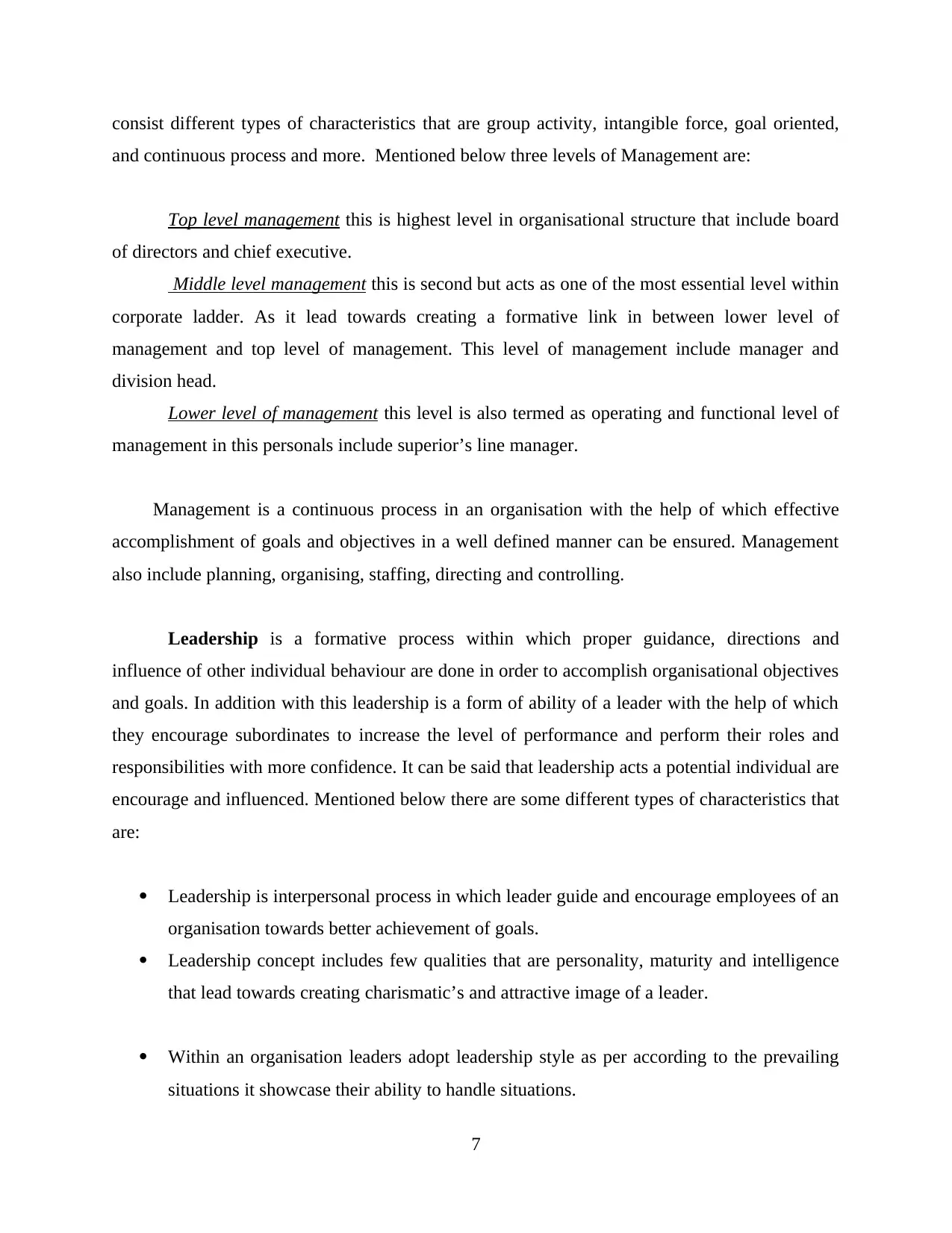
consist different types of characteristics that are group activity, intangible force, goal oriented,
and continuous process and more. Mentioned below three levels of Management are:
Top level management this is highest level in organisational structure that include board
of directors and chief executive.
Middle level management this is second but acts as one of the most essential level within
corporate ladder. As it lead towards creating a formative link in between lower level of
management and top level of management. This level of management include manager and
division head.
Lower level of management this level is also termed as operating and functional level of
management in this personals include superior’s line manager.
Management is a continuous process in an organisation with the help of which effective
accomplishment of goals and objectives in a well defined manner can be ensured. Management
also include planning, organising, staffing, directing and controlling.
Leadership is a formative process within which proper guidance, directions and
influence of other individual behaviour are done in order to accomplish organisational objectives
and goals. In addition with this leadership is a form of ability of a leader with the help of which
they encourage subordinates to increase the level of performance and perform their roles and
responsibilities with more confidence. It can be said that leadership acts a potential individual are
encourage and influenced. Mentioned below there are some different types of characteristics that
are:
Leadership is interpersonal process in which leader guide and encourage employees of an
organisation towards better achievement of goals.
Leadership concept includes few qualities that are personality, maturity and intelligence
that lead towards creating charismatic’s and attractive image of a leader.
Within an organisation leaders adopt leadership style as per according to the prevailing
situations it showcase their ability to handle situations.
7
and continuous process and more. Mentioned below three levels of Management are:
Top level management this is highest level in organisational structure that include board
of directors and chief executive.
Middle level management this is second but acts as one of the most essential level within
corporate ladder. As it lead towards creating a formative link in between lower level of
management and top level of management. This level of management include manager and
division head.
Lower level of management this level is also termed as operating and functional level of
management in this personals include superior’s line manager.
Management is a continuous process in an organisation with the help of which effective
accomplishment of goals and objectives in a well defined manner can be ensured. Management
also include planning, organising, staffing, directing and controlling.
Leadership is a formative process within which proper guidance, directions and
influence of other individual behaviour are done in order to accomplish organisational objectives
and goals. In addition with this leadership is a form of ability of a leader with the help of which
they encourage subordinates to increase the level of performance and perform their roles and
responsibilities with more confidence. It can be said that leadership acts a potential individual are
encourage and influenced. Mentioned below there are some different types of characteristics that
are:
Leadership is interpersonal process in which leader guide and encourage employees of an
organisation towards better achievement of goals.
Leadership concept includes few qualities that are personality, maturity and intelligence
that lead towards creating charismatic’s and attractive image of a leader.
Within an organisation leaders adopt leadership style as per according to the prevailing
situations it showcase their ability to handle situations.
7
Paraphrase This Document
Need a fresh take? Get an instant paraphrase of this document with our AI Paraphraser
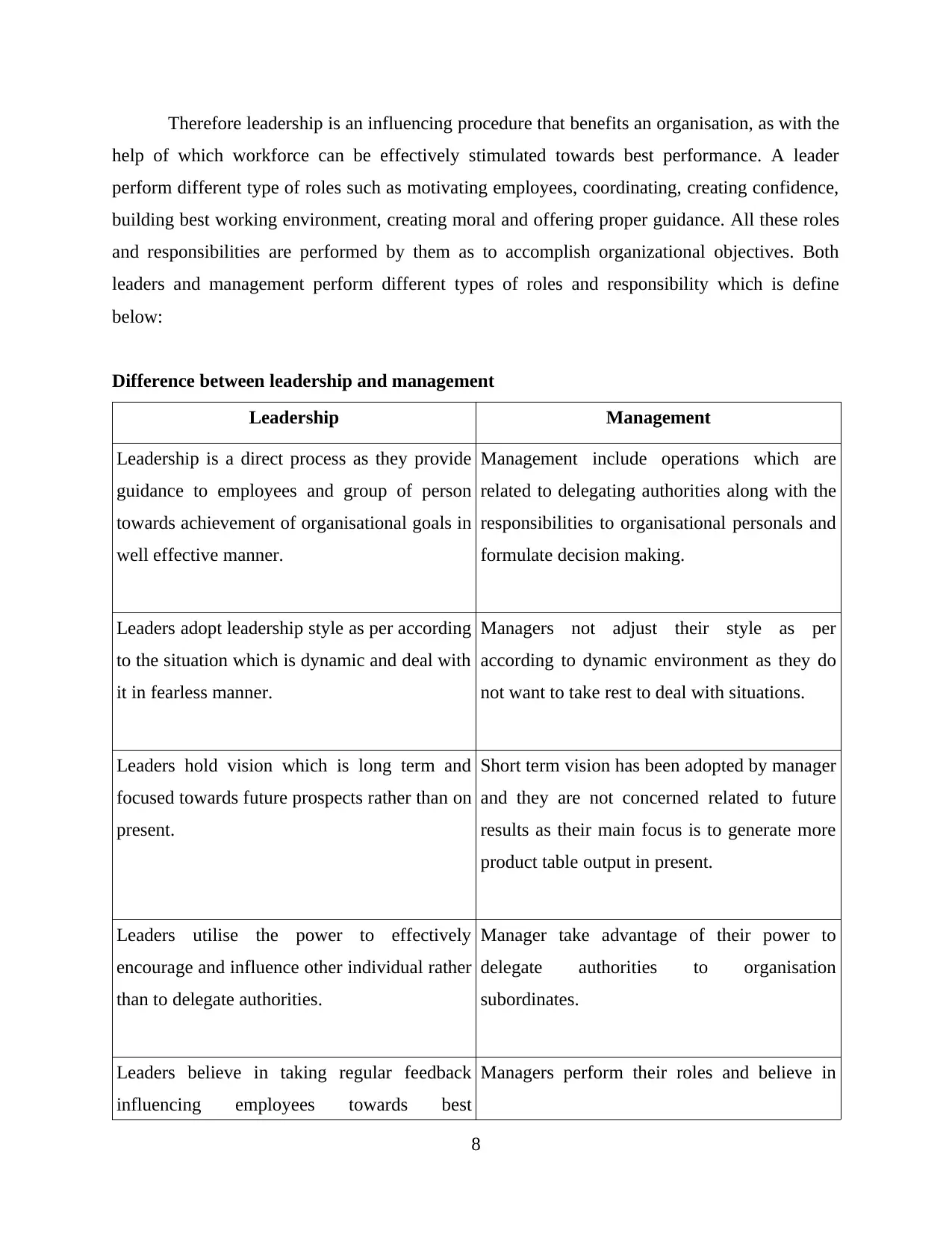
Therefore leadership is an influencing procedure that benefits an organisation, as with the
help of which workforce can be effectively stimulated towards best performance. A leader
perform different type of roles such as motivating employees, coordinating, creating confidence,
building best working environment, creating moral and offering proper guidance. All these roles
and responsibilities are performed by them as to accomplish organizational objectives. Both
leaders and management perform different types of roles and responsibility which is define
below:
Difference between leadership and management
Leadership Management
Leadership is a direct process as they provide
guidance to employees and group of person
towards achievement of organisational goals in
well effective manner.
Management include operations which are
related to delegating authorities along with the
responsibilities to organisational personals and
formulate decision making.
Leaders adopt leadership style as per according
to the situation which is dynamic and deal with
it in fearless manner.
Managers not adjust their style as per
according to dynamic environment as they do
not want to take rest to deal with situations.
Leaders hold vision which is long term and
focused towards future prospects rather than on
present.
Short term vision has been adopted by manager
and they are not concerned related to future
results as their main focus is to generate more
product table output in present.
Leaders utilise the power to effectively
encourage and influence other individual rather
than to delegate authorities.
Manager take advantage of their power to
delegate authorities to organisation
subordinates.
Leaders believe in taking regular feedback
influencing employees towards best
Managers perform their roles and believe in
8
help of which workforce can be effectively stimulated towards best performance. A leader
perform different type of roles such as motivating employees, coordinating, creating confidence,
building best working environment, creating moral and offering proper guidance. All these roles
and responsibilities are performed by them as to accomplish organizational objectives. Both
leaders and management perform different types of roles and responsibility which is define
below:
Difference between leadership and management
Leadership Management
Leadership is a direct process as they provide
guidance to employees and group of person
towards achievement of organisational goals in
well effective manner.
Management include operations which are
related to delegating authorities along with the
responsibilities to organisational personals and
formulate decision making.
Leaders adopt leadership style as per according
to the situation which is dynamic and deal with
it in fearless manner.
Managers not adjust their style as per
according to dynamic environment as they do
not want to take rest to deal with situations.
Leaders hold vision which is long term and
focused towards future prospects rather than on
present.
Short term vision has been adopted by manager
and they are not concerned related to future
results as their main focus is to generate more
product table output in present.
Leaders utilise the power to effectively
encourage and influence other individual rather
than to delegate authorities.
Manager take advantage of their power to
delegate authorities to organisation
subordinates.
Leaders believe in taking regular feedback
influencing employees towards best
Managers perform their roles and believe in
8
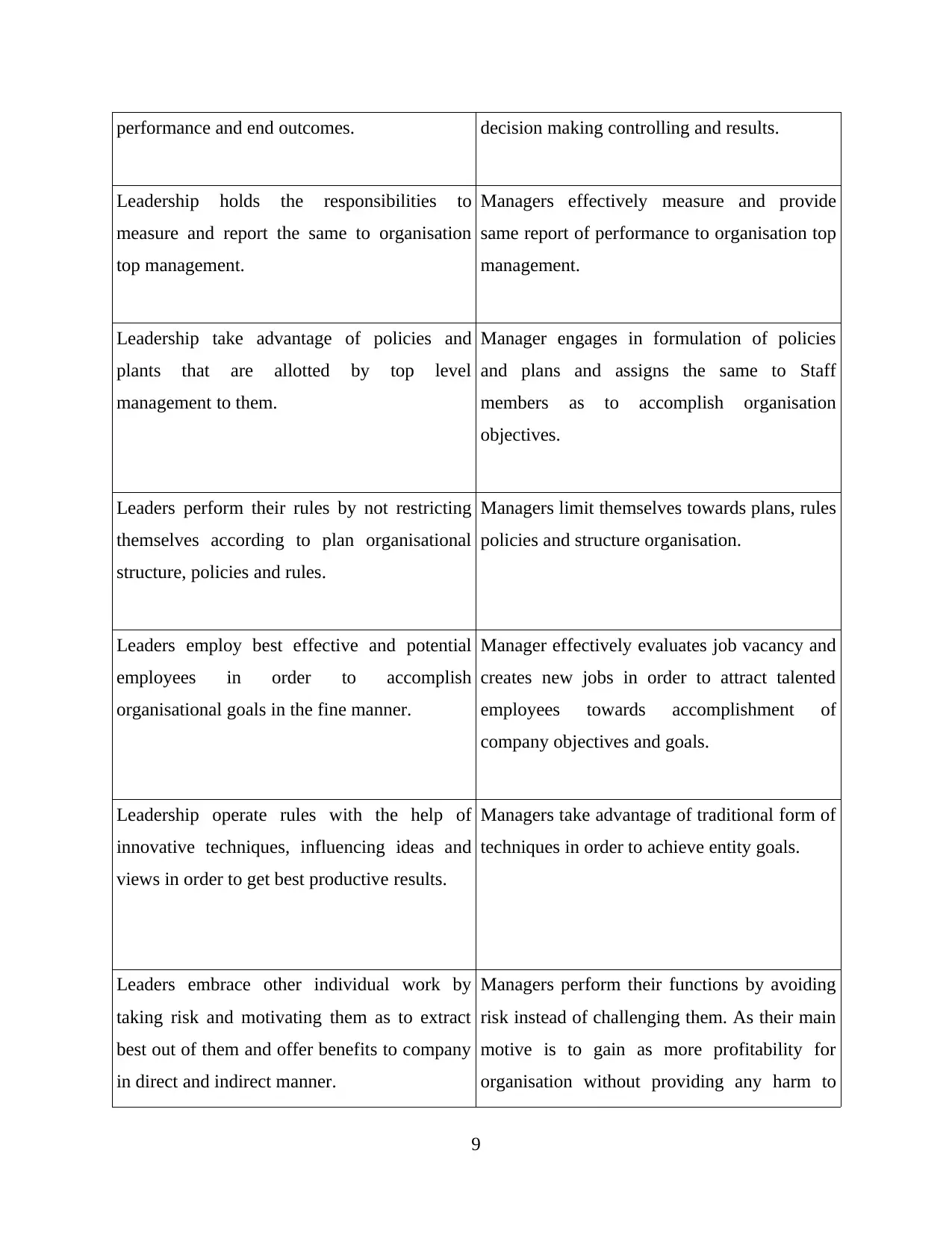
performance and end outcomes. decision making controlling and results.
Leadership holds the responsibilities to
measure and report the same to organisation
top management.
Managers effectively measure and provide
same report of performance to organisation top
management.
Leadership take advantage of policies and
plants that are allotted by top level
management to them.
Manager engages in formulation of policies
and plans and assigns the same to Staff
members as to accomplish organisation
objectives.
Leaders perform their rules by not restricting
themselves according to plan organisational
structure, policies and rules.
Managers limit themselves towards plans, rules
policies and structure organisation.
Leaders employ best effective and potential
employees in order to accomplish
organisational goals in the fine manner.
Manager effectively evaluates job vacancy and
creates new jobs in order to attract talented
employees towards accomplishment of
company objectives and goals.
Leadership operate rules with the help of
innovative techniques, influencing ideas and
views in order to get best productive results.
Managers take advantage of traditional form of
techniques in order to achieve entity goals.
Leaders embrace other individual work by
taking risk and motivating them as to extract
best out of them and offer benefits to company
in direct and indirect manner.
Managers perform their functions by avoiding
risk instead of challenging them. As their main
motive is to gain as more profitability for
organisation without providing any harm to
9
Leadership holds the responsibilities to
measure and report the same to organisation
top management.
Managers effectively measure and provide
same report of performance to organisation top
management.
Leadership take advantage of policies and
plants that are allotted by top level
management to them.
Manager engages in formulation of policies
and plans and assigns the same to Staff
members as to accomplish organisation
objectives.
Leaders perform their rules by not restricting
themselves according to plan organisational
structure, policies and rules.
Managers limit themselves towards plans, rules
policies and structure organisation.
Leaders employ best effective and potential
employees in order to accomplish
organisational goals in the fine manner.
Manager effectively evaluates job vacancy and
creates new jobs in order to attract talented
employees towards accomplishment of
company objectives and goals.
Leadership operate rules with the help of
innovative techniques, influencing ideas and
views in order to get best productive results.
Managers take advantage of traditional form of
techniques in order to achieve entity goals.
Leaders embrace other individual work by
taking risk and motivating them as to extract
best out of them and offer benefits to company
in direct and indirect manner.
Managers perform their functions by avoiding
risk instead of challenging them. As their main
motive is to gain as more profitability for
organisation without providing any harm to
9
⊘ This is a preview!⊘
Do you want full access?
Subscribe today to unlock all pages.

Trusted by 1+ million students worldwide
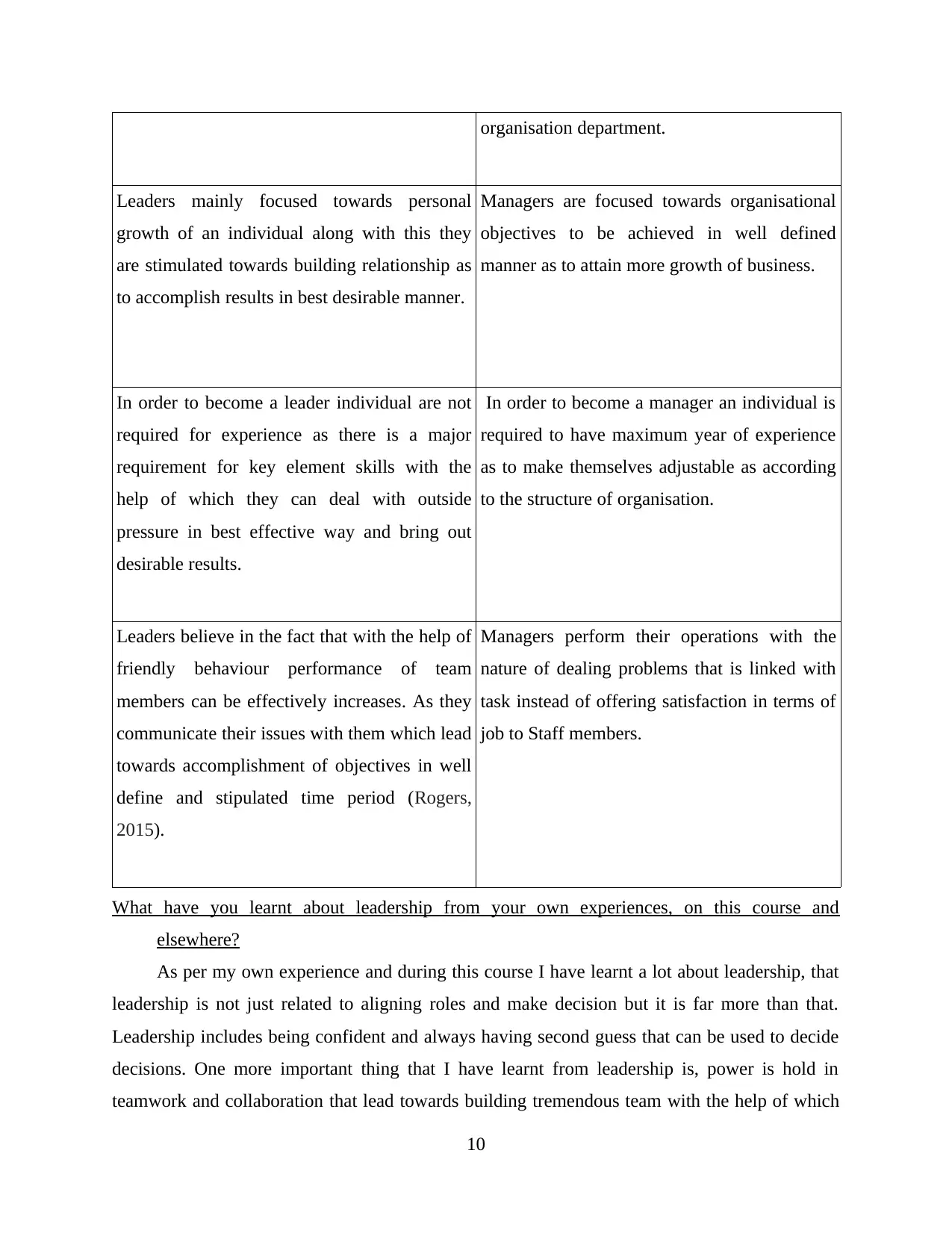
organisation department.
Leaders mainly focused towards personal
growth of an individual along with this they
are stimulated towards building relationship as
to accomplish results in best desirable manner.
Managers are focused towards organisational
objectives to be achieved in well defined
manner as to attain more growth of business.
In order to become a leader individual are not
required for experience as there is a major
requirement for key element skills with the
help of which they can deal with outside
pressure in best effective way and bring out
desirable results.
In order to become a manager an individual is
required to have maximum year of experience
as to make themselves adjustable as according
to the structure of organisation.
Leaders believe in the fact that with the help of
friendly behaviour performance of team
members can be effectively increases. As they
communicate their issues with them which lead
towards accomplishment of objectives in well
define and stipulated time period (Rogers,
2015).
Managers perform their operations with the
nature of dealing problems that is linked with
task instead of offering satisfaction in terms of
job to Staff members.
What have you learnt about leadership from your own experiences, on this course and
elsewhere?
As per my own experience and during this course I have learnt a lot about leadership, that
leadership is not just related to aligning roles and make decision but it is far more than that.
Leadership includes being confident and always having second guess that can be used to decide
decisions. One more important thing that I have learnt from leadership is, power is hold in
teamwork and collaboration that lead towards building tremendous team with the help of which
10
Leaders mainly focused towards personal
growth of an individual along with this they
are stimulated towards building relationship as
to accomplish results in best desirable manner.
Managers are focused towards organisational
objectives to be achieved in well defined
manner as to attain more growth of business.
In order to become a leader individual are not
required for experience as there is a major
requirement for key element skills with the
help of which they can deal with outside
pressure in best effective way and bring out
desirable results.
In order to become a manager an individual is
required to have maximum year of experience
as to make themselves adjustable as according
to the structure of organisation.
Leaders believe in the fact that with the help of
friendly behaviour performance of team
members can be effectively increases. As they
communicate their issues with them which lead
towards accomplishment of objectives in well
define and stipulated time period (Rogers,
2015).
Managers perform their operations with the
nature of dealing problems that is linked with
task instead of offering satisfaction in terms of
job to Staff members.
What have you learnt about leadership from your own experiences, on this course and
elsewhere?
As per my own experience and during this course I have learnt a lot about leadership, that
leadership is not just related to aligning roles and make decision but it is far more than that.
Leadership includes being confident and always having second guess that can be used to decide
decisions. One more important thing that I have learnt from leadership is, power is hold in
teamwork and collaboration that lead towards building tremendous team with the help of which
10
Paraphrase This Document
Need a fresh take? Get an instant paraphrase of this document with our AI Paraphraser
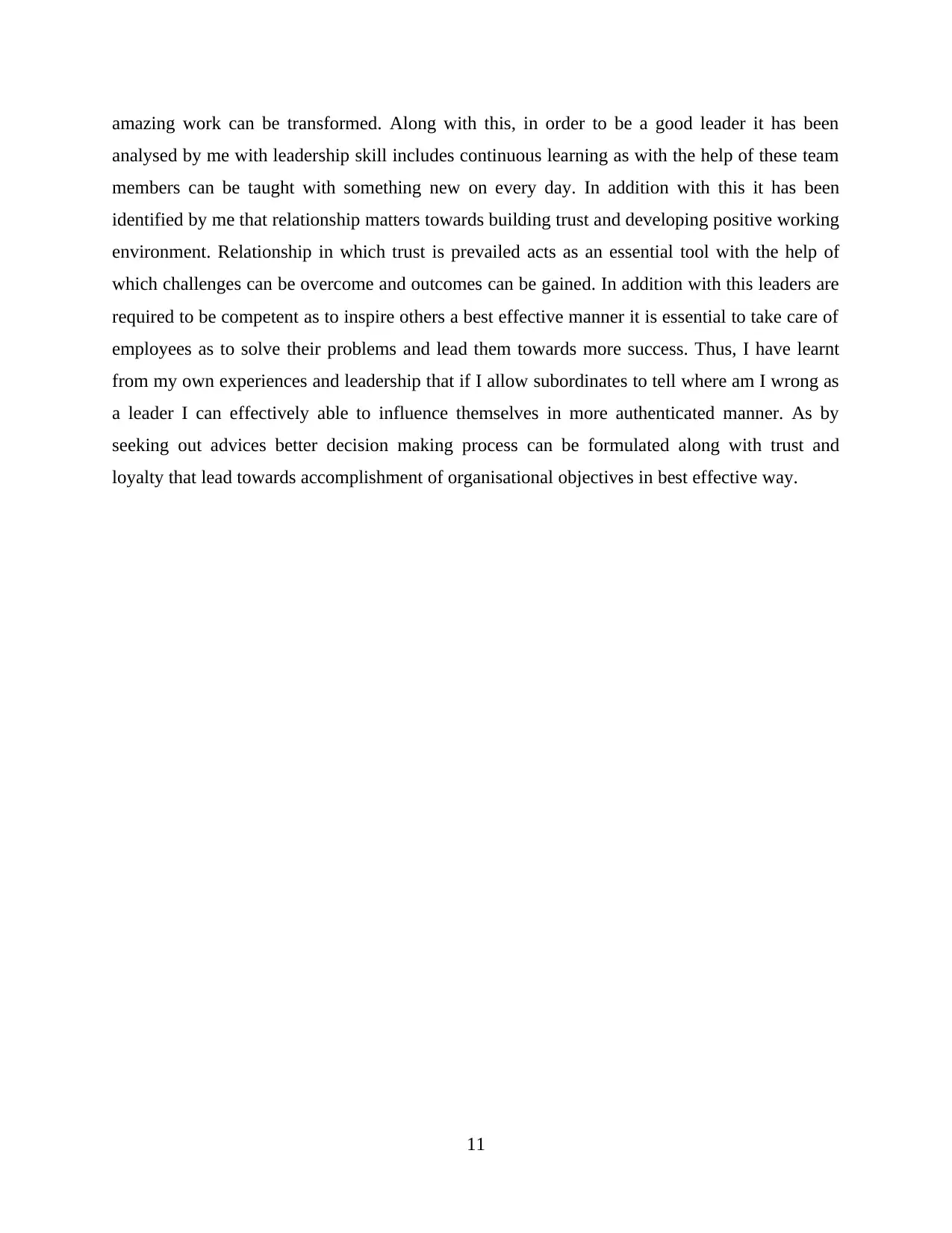
amazing work can be transformed. Along with this, in order to be a good leader it has been
analysed by me with leadership skill includes continuous learning as with the help of these team
members can be taught with something new on every day. In addition with this it has been
identified by me that relationship matters towards building trust and developing positive working
environment. Relationship in which trust is prevailed acts as an essential tool with the help of
which challenges can be overcome and outcomes can be gained. In addition with this leaders are
required to be competent as to inspire others a best effective manner it is essential to take care of
employees as to solve their problems and lead them towards more success. Thus, I have learnt
from my own experiences and leadership that if I allow subordinates to tell where am I wrong as
a leader I can effectively able to influence themselves in more authenticated manner. As by
seeking out advices better decision making process can be formulated along with trust and
loyalty that lead towards accomplishment of organisational objectives in best effective way.
11
analysed by me with leadership skill includes continuous learning as with the help of these team
members can be taught with something new on every day. In addition with this it has been
identified by me that relationship matters towards building trust and developing positive working
environment. Relationship in which trust is prevailed acts as an essential tool with the help of
which challenges can be overcome and outcomes can be gained. In addition with this leaders are
required to be competent as to inspire others a best effective manner it is essential to take care of
employees as to solve their problems and lead them towards more success. Thus, I have learnt
from my own experiences and leadership that if I allow subordinates to tell where am I wrong as
a leader I can effectively able to influence themselves in more authenticated manner. As by
seeking out advices better decision making process can be formulated along with trust and
loyalty that lead towards accomplishment of organisational objectives in best effective way.
11

12
⊘ This is a preview!⊘
Do you want full access?
Subscribe today to unlock all pages.

Trusted by 1+ million students worldwide
1 out of 13
Related Documents
Your All-in-One AI-Powered Toolkit for Academic Success.
+13062052269
info@desklib.com
Available 24*7 on WhatsApp / Email
![[object Object]](/_next/static/media/star-bottom.7253800d.svg)
Unlock your academic potential
Copyright © 2020–2026 A2Z Services. All Rights Reserved. Developed and managed by ZUCOL.





